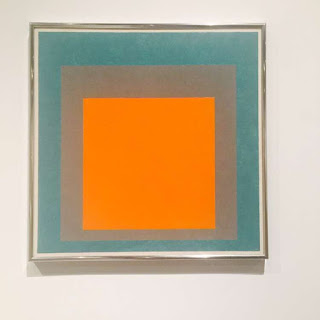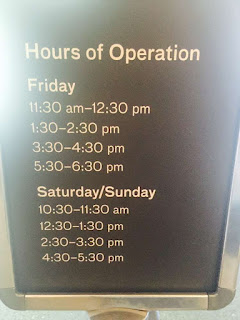I
went to LACMA today and enjoyed almost all of the artworks. However, influenced
by this class, I was more impressed by some specific artworks that are related to
science.
 |
| Robert Philippi, Madchen (Girls) |
 |
| Liebespaar and I |
 |
| Robert Philippi, Liebespaar (Lovers) |
As soon as I walked in the first
exhibition room and saw two Robert Philippi’s drawings, I found the connection
between art and medical technology – MRI. In Liebespaar and Madchen,
Philippi draws the muscle, ribs and joints under the skin of the figures. The
body structure under the skin cannot be seen by naked eyes. Philippi is able to
draw the bones because he is aware of the images produced by MRI. The medical
technology is well incorporated in these two drawings.
 |
| Joseph Albers, Homage to the Square, 1951 |
 |
| Joseph Albers, Honage to the Square: Dissolving/Vanishing, 1951 |
 |
| Joseph Albers, Homage to the Square, 1957 |
 |
| Joseph Albers, Homage to the Square, 1951-55 |
I also found coexistence of art and
science in Joseph Albers’s paintings. In Homage
to the Square (1951), Homage to the Square: Dissolving/Vanishing, Homage to the
Square (1957) and Homage to the Square (1951-55), geometrical squares
(math) are the only subject matters. As a result, this series of paintings is
not only aesthetically pleasing but scientific as well.
 |
| Chris Burden, MetropolisⅡ, 2011 |
The artwork amazed me the most is Chris
Burden’s MetropolisⅡ. It is a
kinetic sculpture that represents a fast paced modern city. The most
interesting part to me is the speeding miniature cars which are slow when going
up and fast when going down. Although I am not very good at physics, I can tell
that this artwork involves energy transformation between gravitational
potential energy and kinetic energy. I also found out that MetropolisⅡ is only operated for one hour a time and has to
rest for one hour after each time. I asked the docent of LACMA about this
schedule. She told me that the cars need to be cooled down or else they would
break apart due to friction. Not only the operation of this artwork depends on physics
but the schedule of operation also depends on physics. As a result, no one could deny
the relation between this artwork and science.
 |
| Hours of Operation |
Before
taking this class, I simply thought the art world as a separated world.
However, after realizing various connections between art and science in this
class, I know how to appreciate many of the artworks better.









没有评论:
发表评论